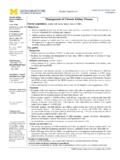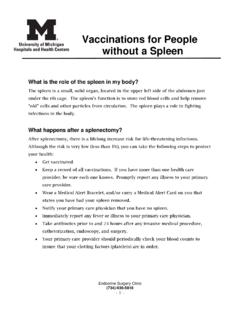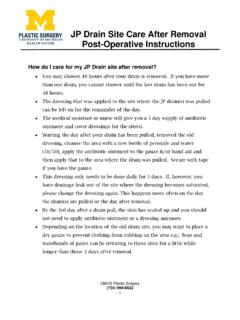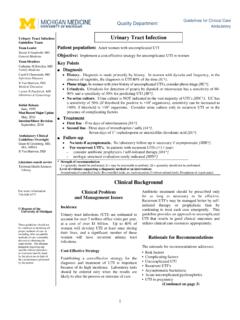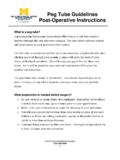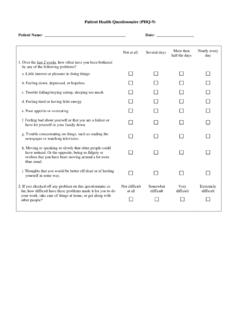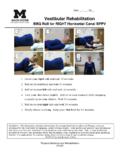Transcription of Allergy Immunotherapy (Allergy Shots): What You Should Know
1 Allergy and Clinical Immunology - 1 - Allergy Immunotherapy ( Allergy Shots): What You Should Know What are Allergy shots? Allergy Immunotherapy ( Allergy shots ) are shots given regularly to decrease sensitivity to a specific, Allergy -producing substance. It is the only method that offers a cure for allergies. Shots would be a good fit for people whose symptoms are hard to control with other medications, those who have a hard time avoiding certain allergens, and those with year-long symptoms or severe symptoms.
2 Patients must be able to follow the program plan to receive Allergy shots. When will my Allergy symptoms improve? If you are receiving treatment for inhaled allergens, such as pollen, dust mites, mold and animals, you probably will not notice any difference in how you feel until you have received maintenance therapy for at least 5-6 months. It may take up to 18-24 months before you notice any benefit. Allergy Immunotherapy does not provide immediate relief. For people allergic to insect stings (venom Immunotherapy ), the treatment usually takes 4-6 months of maintenance shots before you are protected.
3 How often do I get my shots? To begin, every 3-10 days you will come in and receive a shot(s) , this is called the building process . The building process only takes 15 weeks if you do not miss a dose and you receive your Allergy shot(s) twice per week. When you finish the building process you will need to receive your shot(s) every 7-28 days for at least 5 years. If you stop Immunotherapy for more than four weeks, your next dose will need to be reduced for safety. If you have any questions, contact your allergist.
4 Allergy and Clinical Immunology Allergy Immunotherapy ( Allergy Shots): What You Should Know - 2 - When shouldn t I get my shots? There are certain conditions where you will have to stop or change your treatment to avoid the risk of a bad reaction. Follow these precautions to continue your treatments safely: Avoid strenuous exercise and exposure to excessive heat for 2 hours before and after shots. If you have had a recent change in your health status, including a cold , fever, pregnancy, excessive hay fever or any asthma symptoms, or if you have been prescribed new prescription medications, please report this to the person giving you your shot(s).
5 If you are sick, please make an appointment to see a doctor. If you are unsure if you Should get your shot(s), please call our office. How long will I need to continue treatment? To successfully treat your allergies, you will have to receive year-round shots for several (usually at least 5) years. Ask your allergist ( Allergy doctor) when you meet with them if you have questions about your shots and how long you will continue them. When will I need to meet with my allergist? You will need a visit with your allergist at least once per year to continue receiving your Allergy shots, even if you have your shots given by your primary care doctor.
6 If you receive your shots at another office, please bring a copy of your shot record to your annual visit. It is best to schedule a return visit for during your peak Allergy season. You will not receive another skin test unless you request it or if your doctor thinks it is necessary. Where do I receive treatment? You will need to receive your first shot(s) at our office. Depending on your insurance and your primary care doctor, you may need to continue your shots Allergy and Clinical Immunology Allergy Immunotherapy ( Allergy Shots): What You Should Know - 3 - at your primary care doctor s office.
7 You will need to contact your primary care doctor and make arrangements to receive your shots at their office. What is my part in Immunotherapy treatment? Monitor your reaction to each shot. Notice if you have any local itching, redness, swelling or feel different (unwell) in any way after each shot. If you have an increase in Allergy symptoms promptly following your shot, report this immediately to the person who gave you your shot. Report any type of reaction to the person giving you your shot(s) before you get the next shot(s) so your dose can be adjusted appropriately.
8 You must take your antihistamine, if prescribed daily, before every Immunotherapy appointment. You also must bring your bronchodilator (if you have asthma) and your epinephrine auto injector, if prescribed, to each shot appointment. May I continue taking medications with my Allergy shots? Yes, please continue taking all of your prescribed Allergy medications. Talk to you your allergist before discontinuing any Allergy medication. Tell your allergist or Allergy nurse about any changes to your medications prescribed by your other health care professionals.
9 Do not take Beta-Adrenergic Blocking Agents (BETA BLOCKERS) while receiving Immunotherapy . In addition, do not take Angiotensin Converting Enzyme Inhibitors (ACE-Inhibitors) while on Venom Immunotherapy . These medications may be prescribed for high blood pressure, migraines, glaucoma or other heart problems. If you have questions, please ask before receiving your shot(s). What are the risks? Allergic reactions can occur where the shot is given (locally) or occur elsewhere on the body (generalized).
10 Local swelling following an Allergy shot is not unusual. Discuss any local reaction with your nurse. Generalized reactions to Allergy and Clinical Immunology Allergy Immunotherapy ( Allergy Shots): What You Should Know - 4 - Allergy shots are uncommon and very rarely may be life threatening or even fatal. Reactions almost always begin within 30 minutes after the shot(s). Because of this risk, your doctor must supervise your Immunotherapy in a place where you can receive immediate emergency medical care in case you have a reaction to the shot.
